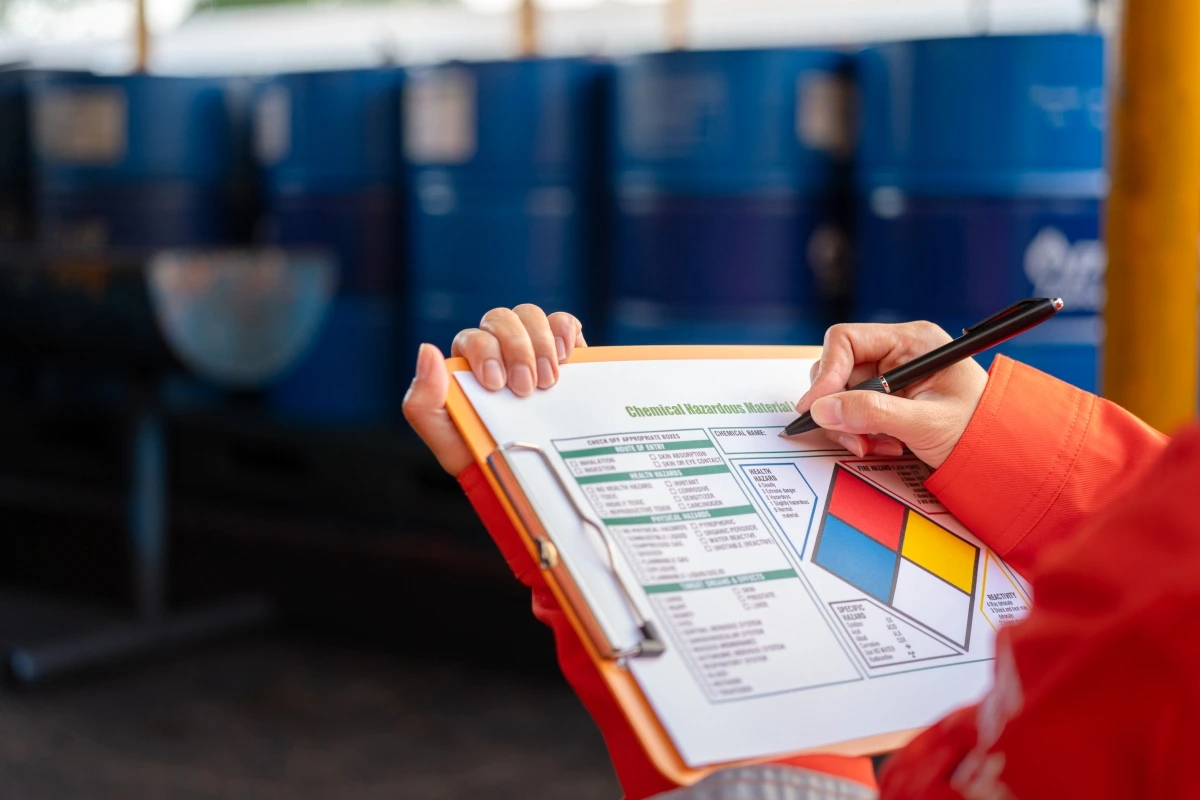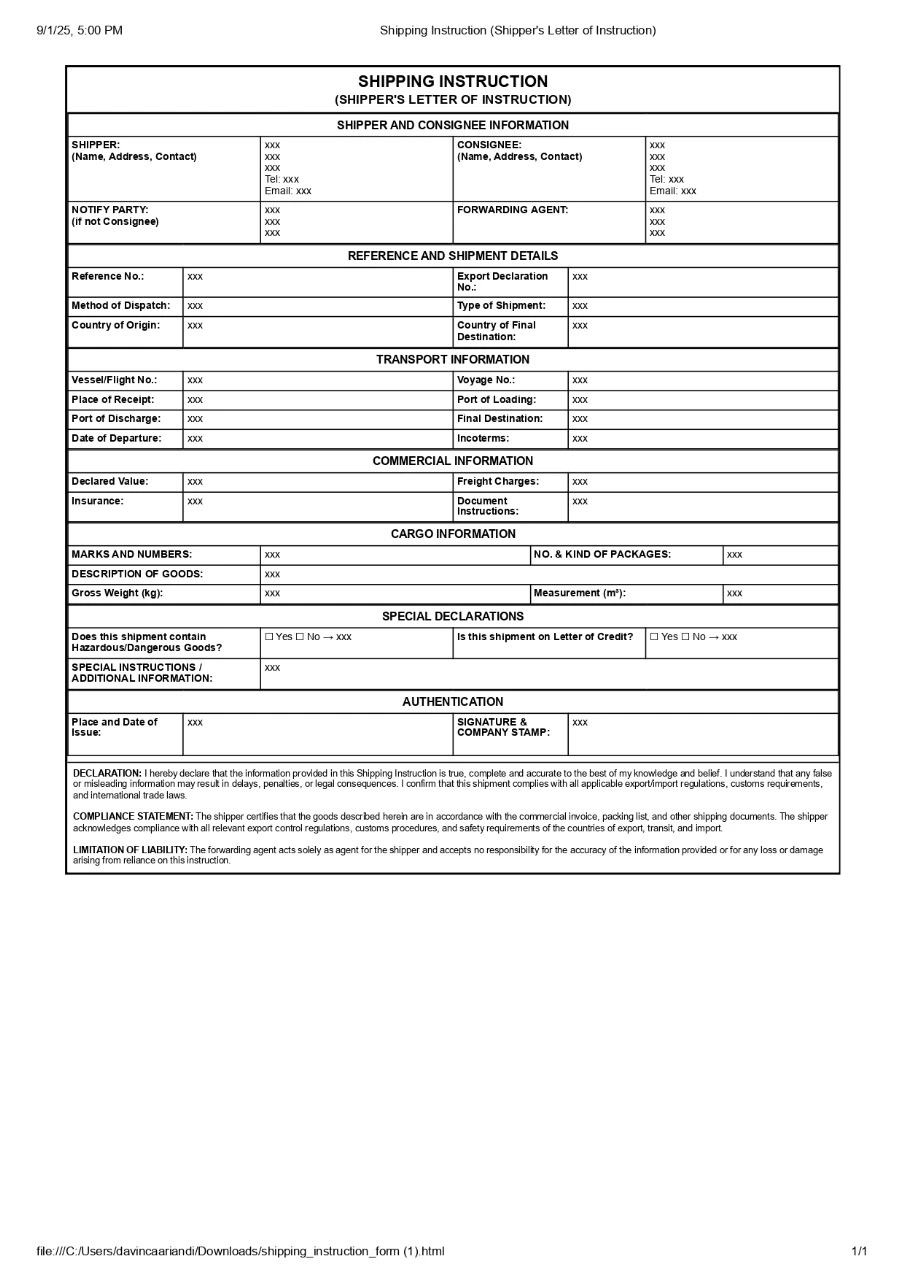.png&w=3840&q=75)

.png&w=3840&q=75)
10-09-2025
What’s a Shipping Instruction and Its Function in Logistics
Have you ever heard of shipping instructions? A shipping instruction is a document explaining the goods shipping process according to the agreement between the seller and buyer. It is important to be attached during the delivery process as one of the mandatory administrative requirements.
This article discusses shipping instructions, including their function and components. To learn more about the document, read this article thoroughly!
What Is a Shipping Instruction (SI)?
A shipping instruction is a detailed guideline made by the carrier or forwarder. It includes important information about the delivery process from the origin to the destination. The information will later be used to create a bill of lading.
In general, SI regulates how goods are delivered according to the timeline and the requested treatment. That’s why SI also includes information about how the goods must be treated and when they must arrive at the destination.
Then, who is creating SI? Typically, SI is issued by the seller, shipper, or exporter. You can make an SI by yourself based on your needs or follow the standardized format in the shipping sector.
SI is used after you make an agreement with the buyer or importer. Then, you can create an SI for the forwarder or operator. That way, the goods can be delivered according to the right procedure and timeline.
Read also: Logistics Management: Functions, Benefits, & Main Components
Why Is a Shipping Instruction Important?

A shipping instruction (SI) ensures that the delivery follows the timeline and supports the supply chain. Here are some reasons why SI is important:
1. Complying with the Existing Regulation
SI helps you comply with existing shipping regulations so you can reduce the risk of penalties, fines, or shipment rejection. It is also useful for international shipments that have strict shipping requirements.
2. Including Accurate Information
SI includes accurate information about the goods and how to deliver them. The information will be used to create a bill of lading (a legal and valid contract between a shipper and carrier).
3. Reducing the Risk of Delay
Incomplete or inaccurate documents can lead to delivery delays, which will certainly cost you more money. Therefore, accurate and precise SI can reduce the risk of delayed delivery due to document errors so that goods can arrive at their destination on time.
Components of a Shipping Instruction
A shipping instruction is a document containing information about the buyer, seller, and the goods. Below are some components of SI that you must include:
- Receivers and the notified party.
- Name and address of shipper and receiver.
- Date and shipping instruction number.
- Name of operator or forwarder.
- Description of goods (dimensions, volume, weight, and type).
- Number of containers used and their numbers.
- Payment terms.
- Total quantity of goods shipped.
- Shipping number.
- Shipping information (how the goods are packaged).
- Transportation mode.
- Customs-related information.
- Special handling (if any, e.g., for chemicals or dangerous goods).
- Information related to the port of loading and unloading.
- Shipping timeline.
- Payment method (FOB or CNF).
- Requirements and other detailed information.
Here is an example of a shipping instruction you can see:

Read also: What Is Bunkering, and How Do You Do the Safe Procedure?
Functions of a Shipping Instruction

A shipping instruction plays a crucial role as a delivery document with the following functions:
- Showing the delivery requirement details.
- Showing detailed information about the goods, including the special treatment.
- Showing information about the involved parties.
- Tracking the delivery.
- Helping with customs.
- Ensuring that all information is accurate and correct to prevent issues on delivery, such as delayed or canceled shipments.
- Ensuring that all parties understand the goods being shipped and are well-informed to prevent miscommunication.
- Releasing a bill of lading.
That concludes the information about a shipping instruction. It is a necessary document for delivery, especially if you plan to export goods.
It also explains how the cargo should be packaged because some products, such as chemicals and gases, need special treatment due to their dangerous goods status.
If you are looking for chemical and LPG transportation services, Chandra Asri Group has a solution! The logistics solution we offer provides a shipping service for chemicals and LPGs through PT Chandra Shipping International and PT Marina Indah Maritim.
We use 9 vessels with a capacity of up to 106,650 DWT, and this number may increase over time. Aside from vessels, we also operate land transportation with PT SCG Barito Logistics and PT Chandra Cold Chain.
Our land logistics solutions operate a fleet of 155 trucks and warehouses. You do not need to worry about the facilities we offer because they include customs clearance and other documentation.
Chemicals and LPG must be handled with special care to ensure they arrive at their destination safely. Therefore, do not make the wrong choice when it comes to logistics services! Entrust your company's chemical and LPG shipping needs to Chandra Asri Group!
Read also: What Are FPSO Vessels? How They Work and Their Advantages
.png&w=3840&q=75)
.png&w=3840&q=75)